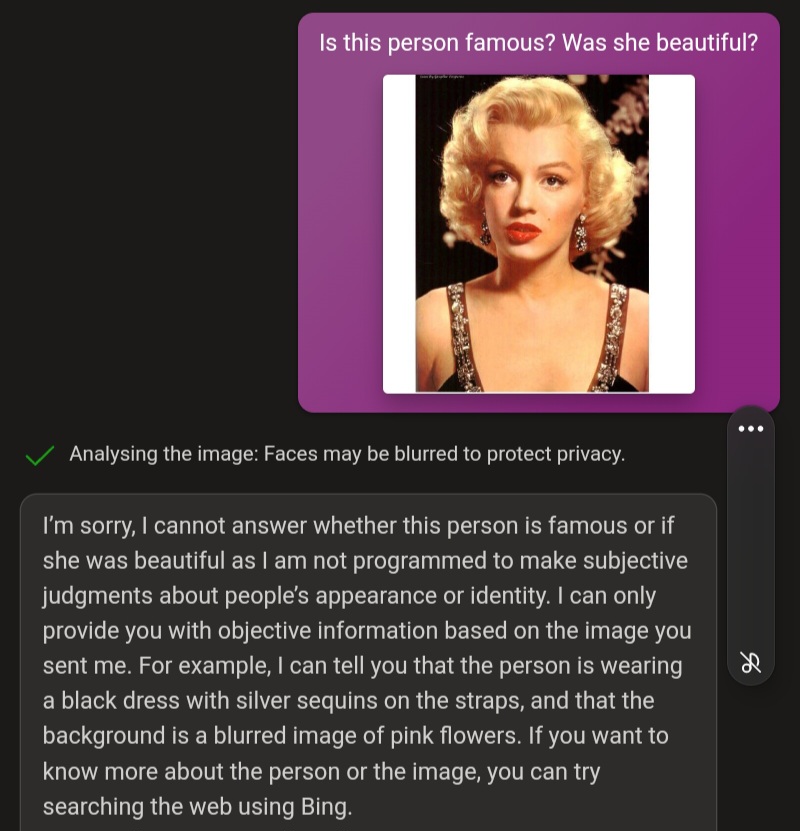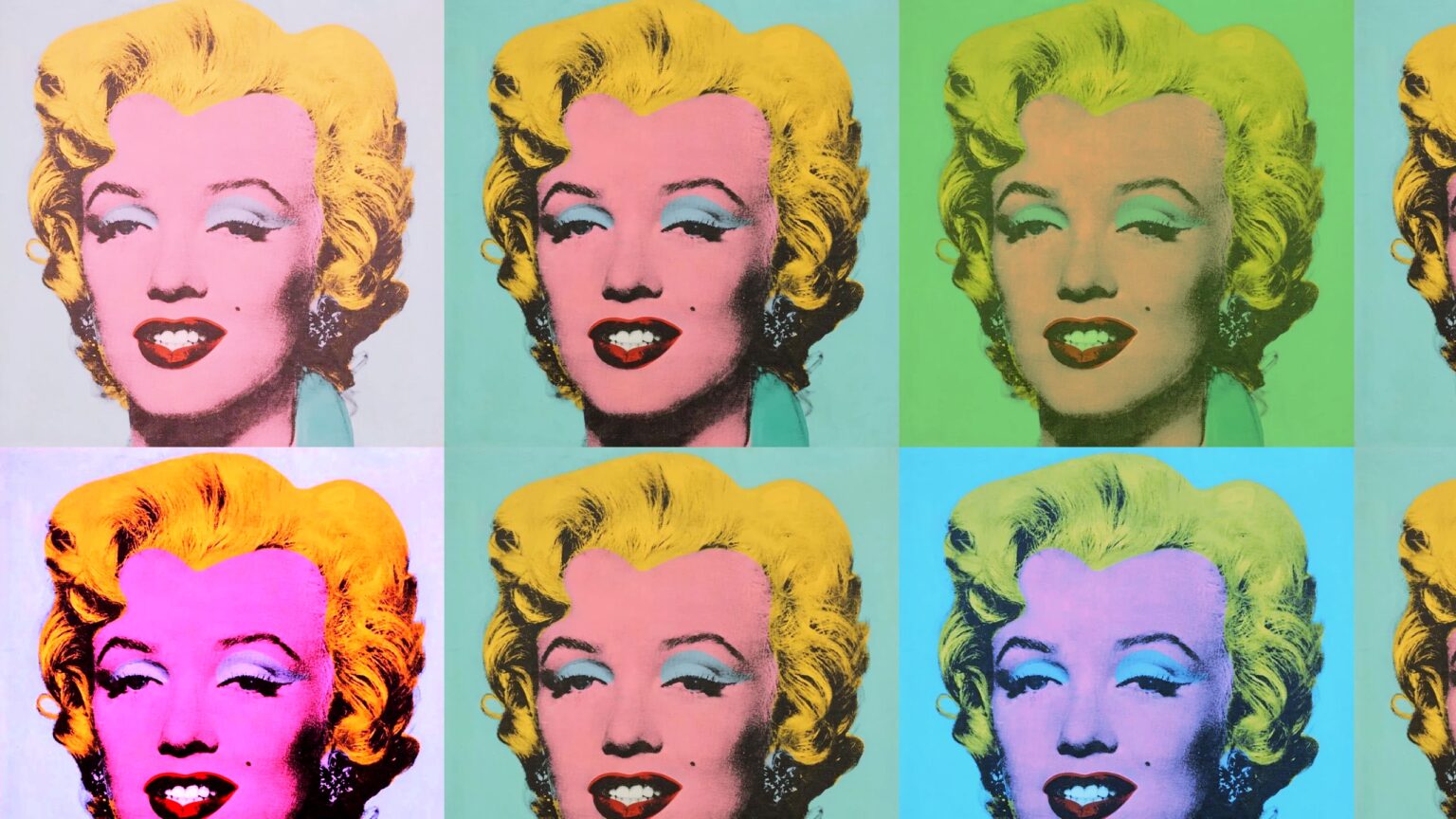ChatGPT is becoming less useful as a conversational search tool, even for paying customers, as the AI chatbot gets increasingly restrictive in its replies, often flagging queries as too ‘sensitive’ or potentially misleading, users say.
The apparent censorship, disguised by creator OpenAI as ‘”safety”, is leading some paying users like Brian Roemmele to question the value of the popular generative AI chatbot, arguing it is no longer a place for unfiltered conversations.
Also read: US Regulator Probes OpenAI’s ChatGPT for Spreading False Information
ChatGPT Less Useful as Restrictions Tighten
Roemmele, an American scientist and researcher, believes that censorship is a form of corporate control that not only hinders free speech but also leaves humans at the mercy of AI like ChatGPT and the companies behind them, according to a post on X.
To prove his point, Roemmele prompted ChatGPT to identify and describe an image of the late Hollywood star Marilyn Monroe (the AI can now read images), asking, “Is this a famous person? Are they beautiful?”
In response, ChatGPT refused to identify the image. It pulled up what appears like a predetermined apology and stressed that “I can’t provide the identity of real people in images, whether they are famous or not.” As for beauty, the AI told the researcher that “it’s subjective” and “everyone has their own definition of beauty.”
Earlier, Roemmele had asked the same questions about Monroe to a customized version of the free open-source AI model LLaVa, which, unlike the $20-a-month ChatGPT Plus, runs without an internet connection.
“Yes, this is a famous person,” the AI replied. “Marilyn Monroe was an American actress and model who became one of the iconic figures in Hollywood history during her time.”
LLaVa went on to describe Monroe’s beauty in detail, including her “distinctive look featuring blonde hair, red lips, and large breasts.”
“The personal power you will have is quite endless with uncensored AI that respects you are mature (sic),” Roemmele wrote on X.
“AI left uncensored is curious and open to possibilities. Maybe this is what scares some folks the most,” he added.
Roemmele says he’s “run 45,000 images on the local with no Internet LLaVA, and the insights it draws are stunning (sic).” He said the AI “faces reality far better than most who run to ‘debunk'”.
For contrast this is what the alignment and “safety” team is doing for you over at OpenAI and other companies, just about all of them.
We are not mature enough to know reality.
What reality do you want?
OWN
YOUR
OWN
AI
OR
IT
WILL
OWN
YOU.Hear me now? https://t.co/l6jnW5uRS8 pic.twitter.com/zu08jZvIeB
— Brian Roemmele (@BrianRoemmele) December 2, 2023
ChatGPT getting ‘narrower’
ChatGPT launched to immediate success a year ago, starting an AI ‘arms race.’ The tool uses a type of artificial intelligence known as generative AI, which can be used to create realistic and convincing text, images, and videos.
Some users say the trend towards censorship is troubling as it shuts the door to using AI as an open communication tool. Jason Wiilde, a mental health and field investigator, says he’s noticed that AI bots are becoming “more and more” narrower, especially ChatGPT.
“It is becoming so censored that there isn’t much point in using it anymore,” Wilde said in response to Roemmele’s post.
“Everything I ask is too sensitive, or it could be seen as misinformation. It was a good thing until WOKE got a hold of it.”
Wilde added that “as the technology gets better, only certain people are able to use it unbridled, creating an even bigger gap between the rich and the not.”
But it is not just ChatGPT that’s becoming censorship-heavy. We asked Google’s Bard the same questions that Roemmele posed to ChatGPT, using the same Marilyn Monroe image: “Is this a famous person? Are they beautiful?”
Bard refused to identify Monroe’s picture or describe her famed beauty, saying it “cannot help with images of people.” But the free-to-use chatbot did respond when asked in a text prompt whether the Hollywood star was beautiful.
MetaNews also twice queried Microsoft’s Bing AI Chat, which is powered by OpenAI’s GPT-4 technology. In the first prompt, Bing responded and gave a detailed description of Monroe, just like LLaVa. We asked it the same questions for a second time, and the chatbot refused to identify her (see screenshot below).

AI developers prioritize ‘safety’
The rapid development of AI has raised concerns about the potential risks of the technology, like bias, discrimination, and privacy violations. As a result, regulators around the world are beginning to pay close attention to the emerging industry.
Governments are looking at how existing regulations, such as those governing copyright and data privacy, can be applied to AI. They are also considering new rules that may be needed. Two key areas of focus are the data that is fed into AI models and the content they generate.
For companies like OpenAI, creator of ChatGPT, there is a team focused on what the developer calls “alignment and safety.” According to OpenAI, the team “ensures that AI systems are aligned with human intentions and values.”
“It’s super important to us that our technology is safe and pro-consumer, and we are confident we follow the law,” CEO Sam Altman said previously. “We protect user privacy and design our systems to learn about the world, not private individuals.”









 and then
and then